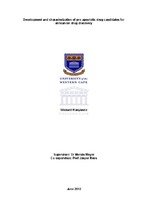| dc.description.abstract | Cancer is one of the leading causes of death worldwide. According to the WHO, cancer accounted for 7.4 million deaths world wide in 2004. The metallo-compound cisplatin has been used for years as an effective antitumor agent for treating solid tumours such as breast, bladder, lung, oesophageal, and head and neck carcinomas. However, the use of cisplatin as an antitumor agent has been limited because of its association with problems such as lack of selectivity for cancer cells over normal cells, development of resistance to cisplatin treatment, and side effects such as nephrotoxicity. Recent studies on anticancer drugs have focussed on alternative anticancer agents such as gold compounds in both Au(I) and (III) oxidation states, which have shown to be potential anticancer drug agents because of their ability to induce apoptosis in several human cancer cells. Some gold complexes have shown to be able to selectively kill cancer cells over normal cells. | en_US |

